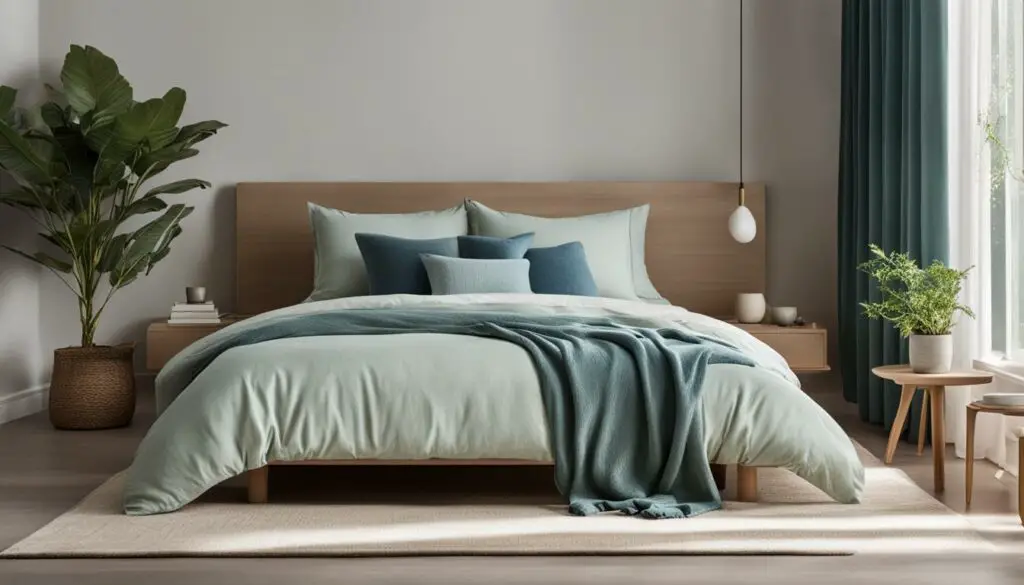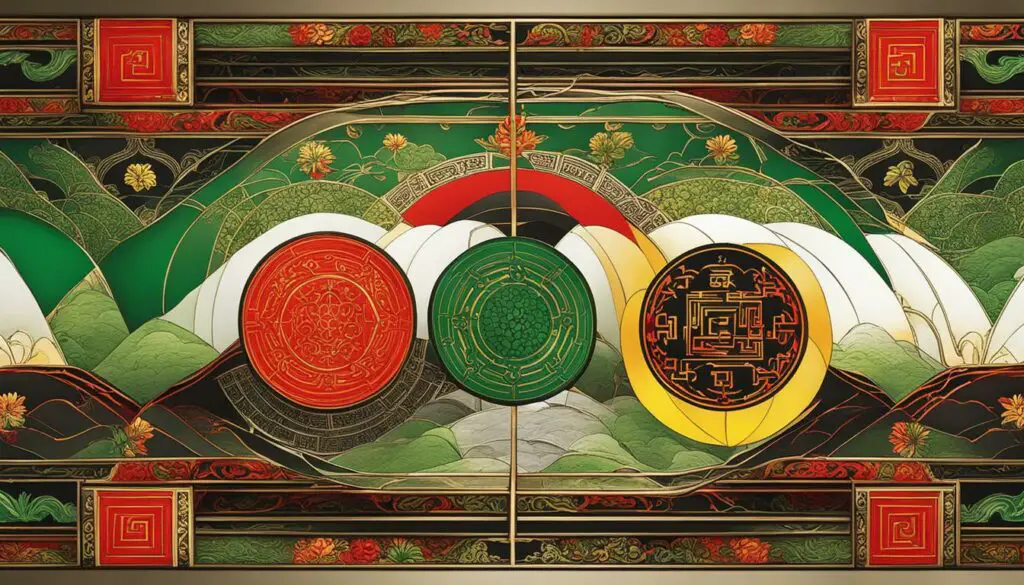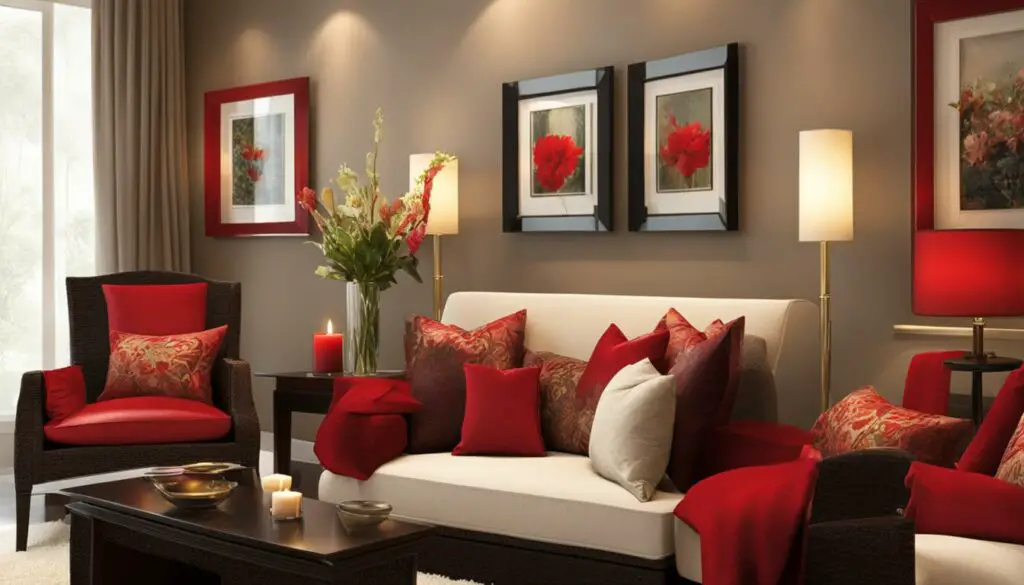If you’ve ever walked into a room and immediately felt at ease, or conversely, experienced a sense of discomfort without being able to pinpoint why, you might have unwittingly experienced the effects of Feng Shui. Feng Shui is an ancient Chinese practice that aims to create harmony and balance in living spaces by arranging furniture, choosing colors, and incorporating symbolic objects in specific ways.
The term Feng Shui loosely translates to “wind-water” in English, and its underlying principles revolve around the idea of Qi (pronounced “chee”), or the life force energy that flows through all things. The goal of Feng Shui is to optimize the flow of this energy in the built environment to promote well-being, prosperity, and happiness.
In this section, we will explore the meaning and significance of Feng Shui, and how it can positively transform your home and life.
Key Takeaways
- Feng Shui is an ancient Chinese practice that aims to create harmony and balance in living spaces.
- The practice revolves around the idea of Qi, or life force energy, and optimizing its flow in the built environment.
- The goal of Feng Shui is to promote well-being, prosperity, and happiness.
- By arranging furniture, choosing colors, and incorporating symbolic objects, Feng Shui can positively transform your home and life.
- Stay tuned to learn more about the fundamental principles of Feng Shui and some practical tips for beginners.
The Principles of Feng Shui
At its core, Feng Shui is about creating harmony and balance between individuals and their environment. It is a practice that emphasizes the connection between humans and the spaces they inhabit, inviting positive energy and promoting well-being.
The fundamental principles of Feng Shui are rooted in the belief that everything is connected and that energy, commonly referred to as “chi,” flows through all things. By balancing and optimizing the flow of energy through our surroundings, we can create a sense of harmony and peace.
The Five Elements
One fundamental aspect of Feng Shui is the understanding and use of the five elements: wood, fire, earth, metal, and water. Each element is associated with particular colors, shapes, and attributes, and they can be used in various combinations to promote balance and harmony in our surroundings. For example, the element of water is associated with the color blue, and it can be used in a room to promote calm and serenity.
The Bagua Map
The Bagua Map is another critical concept in Feng Shui. The Bagua Map is a grid that is placed over a space, with each section representing a different aspect of life, such as career, love, and health. By placing objects and arranging furniture in each section of the Bagua Map, we can create a sense of balance and promote positive energy flow in our environment.
The Yin and Yang
Another principle of Feng Shui is the concept of Yin and Yang, representing the balance between opposing forces. Yin is associated with dark, cool, and passive elements, while Yang is associated with bright, warm, and active elements. By creating a balance of Yin and Yang in our environment, we can create a sense of harmony and promote positive energy flow in our surroundings.
By understanding and applying these fundamental principles, we can create a harmonious environment that promotes well-being, positivity, and balance in our lives.

Feng Shui Tips for Beginners
If you’re new to Feng Shui, you may feel overwhelmed by the multitude of practices and concepts associated with this ancient art. However, incorporating Feng Shui into your life can be a simple and rewarding experience, bringing balance and harmony into your surroundings.
Here are some practical tips and techniques to get you started:
- Declutter: One of the fundamental principles of Feng Shui is the importance of flow, both in energy and physical space. Eliminating clutter and creating a sense of spaciousness is key to promoting positive energy flow in your home.
- Identify Bagua: The Bagua is a Feng Shui energy map that reveals which areas of your home correspond to different aspects of your life, such as health, wealth, and relationships. Identifying the Bagua in your home can help you understand how to apply Feng Shui principles to specific areas.
- Choose Colors Wisely: Color plays a vital role in Feng Shui. Each color carries unique energy that can affect your mood and well-being. Understanding and selecting the right colors for different areas of your home can enhance positive energy flow and promote balance.
- Introduce Plants: Plants are a natural source of positive energy, and they can help purify the air and add a sense of vitality to your living space. Consider incorporating plants into your home decor to promote a sense of well-being and serenity.
- Use Mirrors: Mirrors are a popular Feng Shui remedy for increasing energy flow and enhancing natural light. Placing mirrors strategically can expand a room, reflect positive energy, and deflect negative energy.
By implementing these simple tips, you can begin to experience the transformative power of Feng Shui in your life. Remember, the key to success is to start slowly and incorporate these principles gradually into your daily routine.

Table:
| Feng Shui Tip | Description |
|---|---|
| Eliminate Clutter | The first step to creating a harmonious living space is to eliminate clutter and create a sense of spaciousness. |
| Identify Bagua | Use a Bagua map to identify the different energy centers in your home and apply Feng Shui principles accordingly. |
| Choose Colors Wisely | Each color has a unique energy that can affect your mood and well-being. Choose colors carefully and place them strategically in different areas of your home. |
| Introduce Plants | Plants are a natural source of positive energy and can help purify the air and add a sense of vitality to your living space. |
| Use Mirrors | Strategically placed mirrors can help increase energy flow, enhance natural light, and deflect negative energy. |
Enhancing Your Home with Feng Shui
Your home is your sanctuary. It’s where you unwind and recharge after a long day. But did you know that your home’s energy can impact your mental and physical well-being? Feng Shui can help create a harmonious atmosphere that promotes positivity and tranquility. In this section, we will explore how you can enhance your home with Feng Shui principles.
Furniture Placement
The placement of furniture can significantly impact the flow of energy in your home. Position your furniture in a way that allows for easy movement around the room. Avoid having your back facing the door while sitting at your desk or sofa. This placement can create feelings of vulnerability and discomfort.

Additionally, consider the functionality of each room before arranging furniture. A bedroom should promote rest and relaxation, so avoid having work-related items in this space. Alternatively, a home office or study space should encourage productivity, so ensure it has sufficient lighting, a comfortable chair, and a clear work surface.
Color Psychology
Colors have a significant impact on our emotions and mood. Different colors can evoke different feelings. For example, blue is calming and promotes relaxation, while red is energizing and stimulates activity. Choose colors that align with the intended purpose of each room.
Pro-tip: Consider incorporating natural lighting and indoor plants into your home’s design. They can improve air quality and promote relaxation.
Declutter and Organize
Clutter can create a chaotic and stressful environment. Keep your home organized and tidy to promote clarity and peace of mind. Get rid of items you no longer need or use. Clearing clutter can make your home feel more spacious and promote efficient energy flow.
Balance the Elements
The five Feng Shui elements – wood, fire, earth, metal, and water – play significant roles in creating harmony and balance in your home. Each element symbolizes different emotions and aspects of life. A well-balanced home should incorporate all five elements in harmony. Add plants (wood), choose furnishings in warm tones (fire), incorporate earthy materials like stone or clay (earth), opt for metal accents (metal), and add a small fountain or aquarium (water).
Pro-tip: If you are limited in space, consider incorporating two elements into a single piece. For example, metal and wood can be combined in a decorative piece, providing the benefits of both elements.
By incorporating these Feng Shui principles into your home’s design, you can create a peaceful and harmonious atmosphere. Remember, the energy of your surroundings can significantly impact your well-being. Create a home that promotes positivity and tranquility.
Creating a Serene Bedroom with Feng Shui
Your bedroom is more than just a place to sleep—it’s also a place of relaxation and rejuvenation. By incorporating Feng Shui principles, you can transform your bedroom into a peaceful sanctuary that promotes restful sleep and tranquility.
Declutter and Simplify
Start by decluttering your bedroom and simplifying your decor. Too much clutter can cause stagnant energy, leading to restlessness and an inability to relax. Keep only the essentials in your bedroom and invest in furniture that serves a purpose while also creating a peaceful atmosphere.
Choose Soothing Colors
Colors play a significant role in Feng Shui. For a serene bedroom, choose calming colors such as soft blues, greens, and neutrals. Avoid bright, bold colors or busy patterns that can overstimulate the senses and disrupt peace and tranquility.
Position Your Bed Properly
The placement of your bed is crucial in Feng Shui. It’s best to position your bed so the headboard is against a solid wall and you have a clear view of the bedroom door. This creates a sense of safety and security. Avoid placing your bed under a window or directly facing the door.
Add Plants and Natural Elements
Plants and natural elements can help bring the outside in and promote relaxation. Place potted plants around your bedroom but avoid prickly or spiky plants, which can create negative energy. Use natural materials such as bamboo or wood in your furniture and decor to enhance the calming effects.

An example of a serene bedroom designed with Feng Shui principles.
Minimize Electronic Distractions
Electronics emit electromagnetic fields (EMFs) that can disrupt sleep and create restless energy. Keep your electronic devices away from your bed and turn off all screens at least an hour before sleep. If you must have electronics in your bedroom, minimize their impact by keeping them in closed cabinets or drawers.
By incorporating these Feng Shui tips, you can create a bedroom that promotes relaxation, restful sleep, and overall well-being. Remember, a calm and peaceful environment begins with simplicity and balance.
Understanding Feng Shui Colors
If you are looking to enhance the energy flow in your living space, selecting the right colors is key. Colors in Feng Shui are believed to hold specific meanings and can have a profound impact on the flow of energy in your environment. In this section, we will explore the meaning of various Feng Shui colors and how they can be used to create a harmonious atmosphere in your home or workspace.
The Meanings of Feng Shui Colors
Red: Red is a bold and vibrant color associated with love, passion, and high energy. In Feng Shui, red is believed to stimulate creativity and increase vitality. This color is often used in dining spaces to encourage appetite and promote socialization.
Orange: Orange is a warm and inviting color associated with communication and joy. Like red, it is believed to increase creativity and energy flow. This color is often used in living areas and children’s rooms to promote happiness and playfulness.
Yellow: Yellow is a cheerful and optimistic color associated with intellect and wisdom. In Feng Shui, yellow is believed to promote mental clarity and emotional stability. This color is often used in study or workspaces to enhance concentration and focus.
| Color | Meaning | Usage |
|---|---|---|
| Red | Love, passion, high energy | Dining spaces |
| Orange | Communication, joy | Living areas, children’s rooms |
| Yellow | Intellect, wisdom | Study or workspaces |
Green: Green is a refreshing and calming color associated with growth and renewal. In Feng Shui, green is believed to promote balance and harmony. This color is often used in bedrooms and bathrooms to create a peaceful and calming atmosphere.
Blue: Blue is a calming and soothing color associated with relaxation and tranquility. In Feng Shui, blue is believed to promote mental clarity and emotional stability. This color is often used in bedrooms and living areas to create a serene and tranquil atmosphere.
Purple: Purple is a regal and luxurious color associated with spirituality and intuition. In Feng Shui, purple is believed to promote inner peace and spiritual awareness. This color is often used in meditation or spiritual practices.
| Color | Meaning | Usage |
|---|---|---|
| Green | Growth, renewal | Bedrooms, bathrooms |
| Blue | Relaxation, tranquility | Bedrooms, living areas |
| Purple | Spirituality, intuition | Meditation or spiritual practices |
Using Feng Shui Colors in Your Living Space
To maximize the benefits of Feng Shui colors, it’s important to incorporate them strategically into your living space. Here are a few tips to keep in mind:
- Choose colors based on the specific energy you want to promote in each room.
- Consider using a variety of colors to create a balanced and harmonious atmosphere.
- Use colors in decor, furniture, and textiles to infuse your space with energy.
- Don’t be afraid to experiment with different colors until you find the perfect combination for your home or workspace.

By understanding the meanings of Feng Shui colors and incorporating them strategically into your living space, you can create a harmonious and balanced environment that promotes positive energy flow and overall well-being.
Harnessing the Power of Feng Shui Elements
In Feng Shui, there are five elements: wood, fire, earth, metal, and water. Each of these elements has unique characteristics and energies that can be harnessed to promote balance and harmony in your living space.
Wood: The wood element represents growth, vitality, and abundance. It can be incorporated into your home through the use of plants, wooden furniture, and green accents.
Fire: Fire represents passion, energy, and transformation. You can introduce the fire element into your space through the use of candles, lighting, and bold, bright colors.
Earth: Earth represents stability, nourishment, and grounding. It can be incorporated through the use of earthy colors, pottery, and natural textures like stone or clay.
Metal: Metal represents strength, clarity, and precision. To incorporate metal into your home, use metallic accents, mirrors, and metal decor pieces.
Water: Water represents fluidity, adaptability, and purity. You can introduce water into your space through the use of fountains, aquariums, or decor that evokes the fluidity of water.
When applying Feng Shui principles to your environment, it’s important to maintain a balance of these elements to ensure harmony and positive energy flow. A simple way to do this is to create a ‘bagua’ map of your living space, which outlines the different areas and corresponding elements that should be present in each area. This will help you identify areas that may be lacking in certain elements and allow you to adjust accordingly.

By intentionally incorporating these elements into your living space, you can enhance the energy flow and promote greater balance and harmony in all aspects of your life.
Exploring Feng Shui Symbols
Symbolism plays a significant role in Feng Shui, as it is believed that certain objects have the power to attract positive energy and enhance various aspects of life. By incorporating specific Feng Shui symbols into your living space, you can cultivate a harmonious and balanced environment that promotes overall well-being.
The Most Common Feng Shui Symbols
| Symbol | Meaning |
|---|---|
 |
The Money Frog or Three-Legged Toad is a popular symbol for wealth and prosperity. |
 |
The Dragon is a symbol of power, strength, and good luck, often used to enhance career opportunities. |
 |
The Phoenix is a symbol of rebirth, new beginnings, and positive transformation. |
 |
Bamboo represents resilience and longevity, making it a popular symbol for good health. |
 |
Mandarin Ducks are often used to enhance love and relationships, as they are believed to attract a happy and lasting marriage. |
These are just a few examples of the many Feng Shui symbols that can be incorporated into your living space. When using symbols, it is important to consider their placement, as well as their compatibility with your individual energy. What works for one person may not work for another, so it’s important to trust your intuition when selecting and arranging Feng Shui symbols in your home or office.
By taking the time to understand the symbolism behind various objects and incorporating them into your living space, you can create a more meaningful, energized, and harmonious environment that aligns with your personal goals and desires.
Feng Shui for Wealth and Prosperity
One of the most popular applications of Feng Shui is for attracting wealth and prosperity. Here are some Feng Shui practices that could help you realize financial abundance in your life:
- Declutter your space – A cluttered living space can obstruct the flow of positive energy. Ensure to keep your space clean and tidy to promote positive energy flow and attract wealth.
- Activate your wealth area – The wealth area of your home or office is located in the Southeast corner. By activating this area with Feng Shui cures such as a money tree or a wealth bowl, you can enhance financial prosperity.
- Choose auspicious colors – Colors play a significant role in Feng Shui. Incorporate colors such as green, purple, and gold in your living space, as they are believed to attract wealth and abundance.
- Use symbols of wealth – Feng Shui symbols such as the three-legged money toad or the lucky cat are believed to attract wealth and prosperity. Place them strategically in your living space to harness their positive energy.
- Maintain a working order – Ensure that your doors, faucets, and windows are functional and in good condition. According to Feng Shui, broken objects can obstruct the flow of positive energy and dampen opportunities for financial prosperity.

By implementing these Feng Shui practices, you can optimize the flow of positive energy in your living space and attract wealth and prosperity into your life. Remember, wealth and abundance are not just about money, but also about the rich experiences and opportunities that life has to offer.
Feng Shui for Love and Relationships
Love and relationships are essential aspects of our lives, and Feng Shui can help us cultivate and enhance them. Whether you’re looking to attract a new partner or improve an existing relationship, incorporating Feng Shui principles into your home and environment can make a significant difference.
The Power of the Bedroom
The bedroom is the most important room in the house for love and romance. It should be a peaceful, relaxing sanctuary, free of clutter and distractions. Start by decluttering your space and removing any electronics, exercise equipment, or work-related items. These items can disrupt the calming energy of the room and distract from intimacy.
Next, focus on creating a harmonious atmosphere. Use calming colors like blue, green, and lavender to promote relaxation and tranquility. Add soft lighting, such as dimmer switches or bedside lamps, to create an intimate ambiance. And be sure to invest in a comfortable mattress and high-quality bedding to encourage restful sleep and promote a sense of intimacy.
The Power of Symbols
In Feng Shui, symbols and objects can be used to attract love and strengthen relationships. For example, placing a pair of Mandarin ducks in the southwest corner of your bedroom is said to bring love and devotion into your life. A rose quartz crystal can also be placed in the southwest corner to enhance the energy of love and romance.

Another powerful symbol is the use of pairs. Placing objects in pairs, such as candles, pillows, or nightstands, can symbolize the harmony and balance of a loving relationship. And be sure to remove any single objects, such as a lone chair or artwork, as they can suggest loneliness or separation.
The Power of Communication
Finally, communication is crucial for healthy relationships, and Feng Shui can help to facilitate it. Be sure to position your bed, so you have a clear view of the door but aren’t directly in line with it. This position is said to promote open communication and prevent conflicts.
And if you share a bed with a partner, be sure to have equal space and equal access to bedside tables and lamps. This balance ensures both partners feel equally valued and respected in the relationship.
By incorporating these Feng Shui techniques into your home and environment, you can attract love, strengthen relationships, and cultivate a sense of harmony and balance in your life.
Feng Shui for Health and Well-being
Did you know that Feng Shui can have a positive impact on your physical and mental well-being? By optimizing your living space, you can create an environment that promotes good health, vitality, and overall wellness. Here are some tips for using Feng Shui to improve your health and well-being:
- Declutter: Clutter can create chaos in your living space and negatively impact your mental health. Start by getting rid of items you no longer need or use, and organize the remaining items in a way that promotes a sense of calm and order.
- Maximize natural light: Exposure to natural light has been linked to improved mood and reduced symptoms of depression. Make sure your living space has plenty of natural light by opening curtains and blinds and adding mirrors to reflect light.
- Choose soothing colors: Colors can have a powerful impact on our emotions. Choose calming colors such as blue, green, and purple to promote relaxation and tranquility in your living space.
- Use plants: Plants not only add beauty to your living space, but they can also improve air quality and promote relaxation and stress relief.
- Pay attention to bedroom layout: The bedroom is a crucial space for rest and relaxation. Make sure your bed is positioned in a way that allows for a clear view of the door and avoid placing it directly in line with the door. This creates a sense of security and promotes restful sleep.
- Use essential oils: Essential oils such as lavender, eucalyptus, and peppermint can have a positive impact on your physical and mental well-being. Use a diffuser or add a few drops to a warm bath to promote relaxation and reduce stress.
- Avoid electronics in the bedroom: Electronics such as televisions, laptops, and smartphones emit blue light that can disrupt sleep patterns and negatively impact your health. Avoid using electronics in the bedroom to promote a sense of calm and relaxation.
- Take care of your front entrance: The front entrance of your home is the first thing you see when you enter. Make sure it is well-lit, clutter-free, and welcoming to promote positive energy and good health.
- Stay organized: Keeping your living space organized and free from clutter can reduce stress and promote a sense of calm and order.
- Avoid sharp corners: Sharp corners can create negative energy in your living space. Use plants or furniture to soften sharp corners and promote positive energy flow.
By incorporating these Feng Shui techniques into your living space, you can create a healthy and harmonious environment that promotes physical and mental well-being.

Applying Feng Shui in Office Spaces
Your work environment can have a significant impact on your productivity, motivation, and creativity. Applying Feng Shui principles to your office space can create a harmonious and energizing atmosphere that promotes success and prosperity. Here are some practical tips to help you apply Feng Shui in your office:
Declutter and Organize
A cluttered and disorganized workspace can hinder your mental clarity and focus. Start by decluttering your desk and removing any unnecessary items. Use organizers to keep your stationery, papers, and files neat and tidy. A clean and organized workspace creates a clear mind and allows energy to flow freely.
Position your Desk
Your desk should be positioned to face the door, allowing you to see who enters the room. This placement gives you a sense of control and security. Avoid having your back facing the door, which can create a feeling of vulnerability. If the layout of your office space doesn’t permit this arrangement, consider placing a mirror on your desk to reflect the door.
Choose Colors Wisely
Colors can have a significant impact on your mood and energy levels. In Feng Shui, earthy tones like beige, brown, and green are ideal for promoting stability and productivity. Avoid using red, which is associated with aggression and can create a stressful environment.
Embrace Natural Light and Fresh Air
Natural light and fresh air are essential for a healthy and energizing workspace. If possible, choose an office with windows that allow natural light and fresh air to flow in. If this is not possible, consider using full-spectrum lighting that mimics natural light and investing in an air purifying plant such as a snake plant or peace lily.
Add Meaningful Decorations
Decorations can impact the energy and vibe of your workspace. Choose artwork or decor that is meaningful and inspiring to you. Place a picture of your family, a motivational quote, or a plant to add a personal touch to your workspace. However, be mindful not to clutter your space with too many decorations, which can create distractions.

Applying Feng Shui principles in your office space can create a productive, harmonious, and prosperous environment. By decluttering and organizing your workspace, positioning your desk, choosing colors wisely, embracing natural light and fresh air, and adding meaningful decorations, you can create a workspace that supports your success and well-being.
Conclusion
By incorporating Feng Shui principles into your life and surroundings, you can unlock the power of serenity, balance, and harmony. From understanding the fundamental principles of Feng Shui to incorporating specific techniques for wealth, love, health, and career success, this ancient art has the potential to transform your life in remarkable ways.
Remember, Feng Shui is not a one-size-fits-all solution, and it may take some experimentation to find the right balance that works for you. But with a little patience, persistence, and an open mind, you can create an environment that fosters positive energy, promotes well-being, and cultivates a sense of peace and tranquility in your life.
So go forth and explore the world of Feng Shui! Whether you’re a beginner or an experienced practitioner, there’s always more to uncover and discover in this ancient and fascinating art.
FAQ
What is Feng Shui?
Feng Shui is an ancient art that focuses on creating harmony and balance in one’s life and surroundings. It involves arranging and aligning objects and spaces to optimize the flow of energy, known as chi, to promote positive outcomes and well-being.
What are the principles of Feng Shui?
The principles of Feng Shui revolve around beliefs such as the interconnectedness of everything, the balance of yin and yang energies, and the influence of the five elements (wood, fire, earth, metal, and water). By understanding and applying these principles, one can create an environment that supports harmony and positive energy.
What are some Feng Shui tips for beginners?
For beginners, some practical tips include decluttering your space, incorporating natural elements like plants and water, ensuring good lighting and air circulation, and choosing colors that promote a desired energy. These simple steps can help you get started on your Feng Shui journey.
How can Feng Shui enhance my home?
Feng Shui can enhance your home by optimizing the flow of energy and creating a harmonious environment. This can be achieved through proper furniture placement, color choices, and the use of objects and symbols that symbolize positive energy. By implementing Feng Shui principles, you can create a space that promotes well-being and tranquility.
How can I create a serene bedroom with Feng Shui?
To create a serene bedroom, you can start by placing your bed in the commanding position, which allows you to see the door but is not directly in line with it. Use soothing colors, keep clutter to a minimum, incorporate soft lighting, and add elements like plants or calming artwork. These techniques can help create a peaceful and restful space.
What is the significance of Feng Shui colors?
Feng Shui colors hold specific meanings and can influence the energy in a space. For example, soft blues and greens promote calmness and relaxation, while warm yellows and reds symbolize energy and passion. By understanding the meaning of different colors, you can use them strategically to create the desired atmosphere.
How can I harness the power of Feng Shui elements?
The five Feng Shui elements (wood, fire, earth, metal, and water) each have their own qualities and symbolism. By incorporating these elements in various ways, such as using wood furniture or adding a water feature, you can create a balanced and harmonious energy flow in your environment.
What role do Feng Shui symbols play?
Feng Shui symbols hold significance and can be used to enhance positive energy. For example, a pair of Mandarin ducks symbolizes love and partnership, while a wealth bowl attracts financial abundance. By incorporating these symbols into your space, you can amplify their associated energies.
How can Feng Shui attract wealth and prosperity?
Feng Shui offers techniques to attract wealth, such as placing a money plant or a wealth bowl in specific areas of your home. By creating a space that supports abundance and prosperity, you can align yourself with the energy of wealth and invite it into your life.
How can Feng Shui improve love and relationships?
Feng Shui can positively impact love and relationships by creating an environment that fosters harmony and connection. This can be achieved by using pairs of objects, incorporating romantic colors, and arranging furniture in a way that promotes togetherness and intimacy.
Can Feng Shui improve health and well-being?
Yes, Feng Shui can enhance health and well-being by optimizing the flow of energy in your space. By ensuring proper lighting, good air quality, and a clutter-free environment, you can create a space that supports physical and mental wellness.
How can Feng Shui be applied in office spaces?
In office spaces, Feng Shui principles can be used to improve productivity and success. This can be done by arranging furniture to create a supportive work environment, using colors that stimulate focus and creativity, and incorporating elements that represent growth and abundance.
